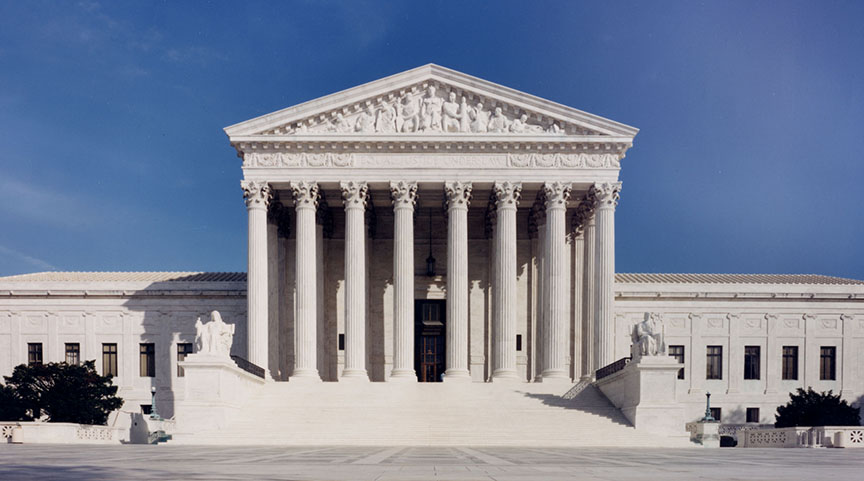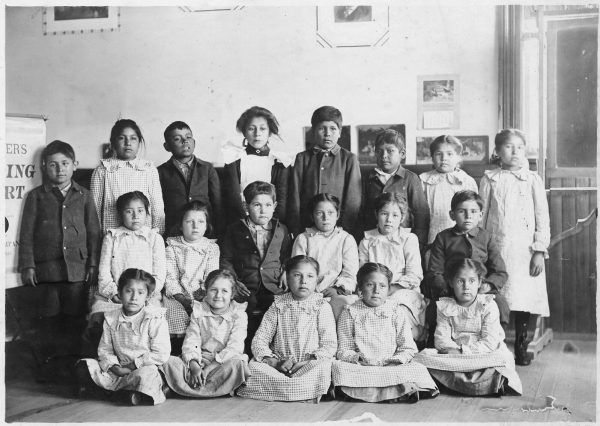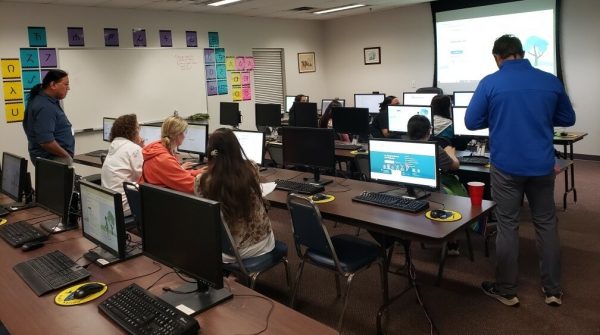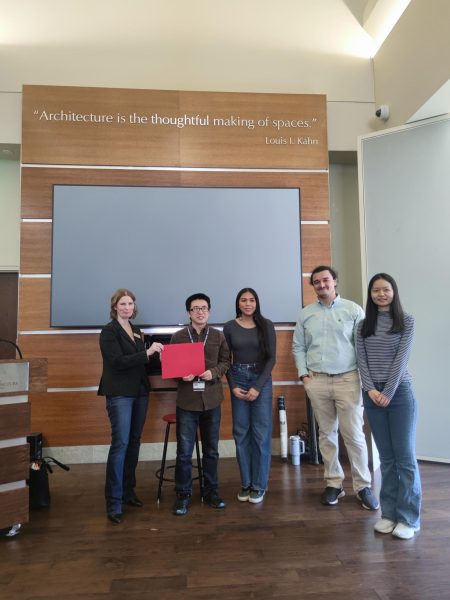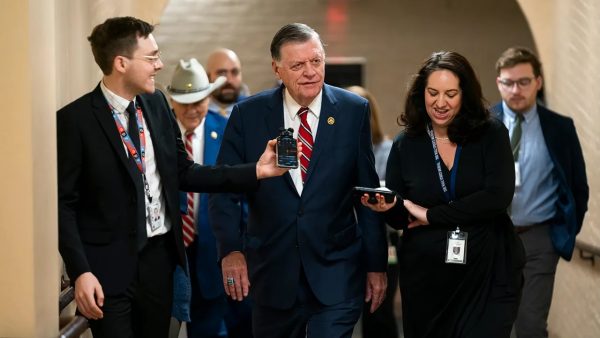Tribes say Supreme Court adoption case could upend decades of federal Indian law
The U.S. Supreme Court is set to hear four cases on Wednesday that will ultimately determine whether the state or federal government bears legal responsibility for the protection of Native children.
At the heart of the debate is the Indian Child Welfare Act. Passed by Congress in 1978, ICWA was aimed to “protect the best interests of Indian children and to promote the stability and security of Indian tribes and families.”
The law gave tribal governments exclusive jurisdiction over Native children who resided on reservations. For Native children who lived off the reservation and ended up in state custody, the law created preferences to place the child with, “a member of the child’s extended family; other members of the Indian child’s tribe; or other Indian families.”
When the law was established, tribes were fighting to address long-standing practices of removal and separation of Native children from their tribes. An Association of American Indian Affairs survey done in 1974 of states with large Native populations found that more than a quarter of all Native children were separated from their families and placed in “foster homes, adoptive homes” or boarding schools. Those mostly-closed Indian boarding schools are now being investigated by the U.S. Department of the Interior.
“When we talk about federal Indian law, and all of these laws that are possibly in jeopardy if we lose this case, I think ICWA is the most important,” said Chrissi Nimmo, deputy attorney general of the Cherokee Nation.
“If we can’t keep our children connected to our tribe, we won’t have tribes in the future. None of the other things that we’re doing to promote sovereignty and resources and grow our economies, none of those things matter if our next generations are taken from us,” she said.
The oral arguments the Supreme Court will hear Wednesday in the consolidation of four cases involving the Chad and Jennifer Brackeen family could do just that in its examination of the legality of the Indian Child Welfare Act on the grounds of racial discrimination and congressional overreach.
A coalition of Native American organizations, including the National Congress of American Indians, is hosting a rally when the Supreme Court convenes Wednesday in opposition to efforts to overturn the child welfare act.
The origins of the legal challenge began in 2016, when a nine-month-old boy of Navajo and Cherokee descent was placed in the care of the Brackeens by Texas child protective services. The Brackeens said they requested to adopt the child with the approval of the biological mother after the parental rights of the child were terminated.
As a result of ICWA’s protocol, which seeks to prioritize the adoption of Native children by Native families, the Navajo Nation intervened and attempted to send the boy to a Navajo family in New Mexico. When the relocation attempt failed, the Brackeens were able to adopt the child in 2018.
Although the Brackeens’ case would have typically ended there, they decided to pursue legal action.
“Not all cases end the way ours did,” Chad Brackeen said in a 2019 interview with Texas Attorney General Ken Paxton. “We hear stories of other people in the same situation across the country… We did that (pursue legal action) so that we can advocate that their (foster parents) best interest and the interest of the child is what is considered in the adoptive placements, not their race.”
Along with the state of Texas, the Brackeens filed a lawsuit in the Federal District Court of Fort Worth in 2017, challenging ICWA. Four tribal nations, including the Cherokee Nation, intervened in the case. In 2018, Judge Reed O’Connor ruled in favor of the Brackeens and the state of Texas.
The case then moved to the U.S.Court of Appeals for the Fifth Circuit, which found the law in violation of the equal protection clause. The United States (Haaland), the Cherokee Nation, the Brackeens and the state of Texas all petitioned the Supreme Court to review the decision
The argument made to the Supreme Court by the state of Texas and Chad Brackeen is that ICWA is unconstitutional on many grounds including its violation of the equal protection clause and the anticommandeering doctrine.
The Brackeens are being supported legally by the Goldwater Institute, a conservative Phoenix think tank located which has made it a goal for many years to overturn the child welfare act. The institute has provided legal services in 13 ICWA cases prior to the Brackeen case.
The institute in its brief to the Supreme Court the institute challenged the racial implications of ICWA, calling it a “race-based” law rather than a political law.
Timothy Sandefur, vice president of legal affairs for the Goldwater Institute, said ICWA causes more harm to Native children than good.
“Because there are so few Indian families looking to adopt, the result of ICWA is that it makes it virtually impossible for Indian children to find permanent adoptive homes when necessary. What ends up happening is these kids spend their lives in foster homes until they just age out of the system, having never found a permanent family,” Sandefur said.
The decision to challenge ICWA has been met with significant backlash from the Native community. The National Congress of American Indians said 497 tribes signed on to 21 briefs submitted to the Supreme Court arguing in favor of “upholding ICWA.”
The tribes in their briefs said Congress had the authority to enact ICWA and that it continues to hold “broad power” over Indian Affairs.
Nimmo is confident ICWA will stand.
“Our position is that the Supreme Court precedent supports us on all of these arguments: that Indian law is not race-based, that Congress does have the authority to enact laws that are affecting Indian people and tribes and that, because of that authority, the states have to enact and follow those laws.”
The federal government and the Cherokee Nation also noted ICWA’s continued importance due to the disproportionate number of Native children in the foster care system. A 2013 study by the Federal Register found Native children to be represented in state foster care at a rate of “2.5 times their presence” in the nation’s population.
The potential landmark decision to overturn ICWA would undo more than 40 years of tribal preference. For the first time since 1978, the responsibility for Native children would fall directly to the state.
But at least nine states, including Oklahoma, have enacted their own versions of the Indian Child Welfare Act which could be unaffected by the Supreme Court’s decision.
If the federal version of ICWA is overturned, the Oklahoma Policy Institute says, political and tribal leaders within the state could collaborate using the “state’s ICWA laws to help ensure the well-being of American Indian and Alaskan Native children in the state.”
The oral arguments of Brackeen v. Haaland are set to be heard by a court that has been historically inconsistent on tribal issues.
In 2020, the landmark Mcgirt v. Oklahoma case gave criminal jurisdiction to tribes across Oklahoma in a 5-4 decision with conservative Justice Neil Gorsuch writing the majority opinion. Just two years later, the court seemingly revised its previous decision in Mcgirt by giving concurrent jurisdiction to state and federal agencies in the Castro v. Huerta decision, with Justice Brett Kavanaugh writing the 5-4 majority opinion. In both cases, Gorsuch crossed party lines defending tribal sovereignty. A ruling on the case will come in 2023.
Gaylord News is a reporting project of the University of Oklahoma Gaylord College of Journalism and Mass Communication. For more stories by Gaylord News go to GaylordNews.net.

